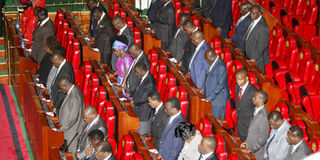Breaking News: CDF Ogolla involved in KDF chopper crash
State arms in uneasy working relationship

MPs during a session in Parliament. Photo/FILE
What you need to know:
- Judiciary and the Executive say summonses from Houses too many
Whether parliamentary committees are demanding too much from other arms of Government in the exercise of the oversight role is a question that begs answers.
Lately there has been friction between the three arms of Government with regard to how they relate in line with Constitutional provisions.
Could MPs be overstepping their mandate?
Article 125 states that either House or any of its committees has power to summon any person to appear before it to give evidence or provide information on any matter.
Both Houses have the same powers as the High Court to enforce the attendance of witnesses and examine them on oath. It also has powers to compel the production of documents and to request to examine witnesses abroad.
However, there have been complaints in the National Assembly in particular, that State officers are not cooperating and the issue of separation of powers has also arisen, especially with regard to relations with the Judiciary.
The Executive arm and the Judiciary report in one way or the other that they feel over-burdened by demands from its Legislative counterpart.
In the past, ministers now, Cabinet Secretaries, were Members of Parliament and would face members on the floor to respond to all manner of issues touching on their dockets. They would face the heat in House sittings on behalf of Government and be held responsible, or, as it were, “taken to task”.
With the change in the Constitution, however, Cabinet Secretaries no longer attend House sessions, because they are appointed from outside Parliament.
They are, however, required to attend sessions of various parliamentary committees when called upon to do, to respond to various issues. Article 153 of the Constitution says a Cabinet Secretary shall appear before a committee of the National Assembly, or the Senate, when required by the committee and answer any questions concerning a matter for which they are responsible.
They are also required in 153 (b), to provide Parliament with full and regular reports concerning matters under their control.
It appears, however, that this requirement in the Constitution has presented a challenge. There are complaints from the Executive that Cabinet Secretaries can hardly have sufficient time to attend to their dockets because of the constant summonses coming from the various committees of the National Assembly and the Senate.
And because the Senate and the National Assembly have committees with overlapping roles, Cabinet Secretaries have on some occasions found themselves summoned by both Houses to respond to the same issues.
Not only that. There have been instances also where different committees of the National Assembly have insisted on conducting parallel investigations on the same issues, which means summoning the same people for questioning.





